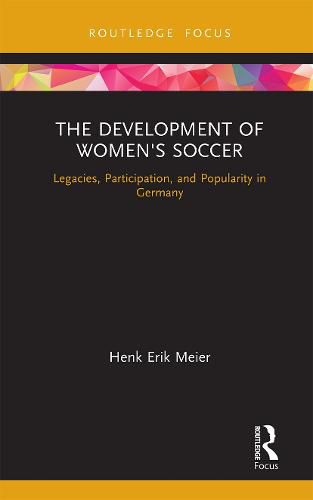Readings Newsletter
Become a Readings Member to make your shopping experience even easier.
Sign in or sign up for free!
You’re not far away from qualifying for FREE standard shipping within Australia
You’ve qualified for FREE standard shipping within Australia
The cart is loading…






While women’s soccer has risen in popularity around the world, research reveals persistent gender discrimination and marginalization of girls and women in the sport. Applying policy feedback theory and econometric analysis, this volume explores the lasting impact of different regimes of gender discrimination on the development of women’s soccer in Germany.
Taking reunified Germany as an ideal case for examining the long-term impact of policy legacies, the book explores how the different systems of gender discrimination in divided Germany have influenced the participation and popularity of women’s soccer. It analyzes the development of grass- roots girls’ and women’s soccer in different regions, and examines the development of the semi- professional Frauen-Bundesliga and the popularity of the national women’s soccer team, which serves as the most important outlet for women’s soccer in Germany. Drawing on these analyses, the book assesses the impact of policy legacies, identifies key challenges for the future of women’s soccer and offers some practical directions for future development. The evidence presented in this book suggests that the sport has experienced substantial long-term growth but is now in a period of stagnation. The book argues that discrimination against girls’ and women’s soccer has long- lasting effects and that the policy priorities adopted by soccer’s governing bodies, local clubs, as well as television operators, have huge significance for the longer-term development of the game.
This is fascinating reading for students and researchers of sport sociology, women’s sport, sports economics, sport development, sport management, and gender studies as well as decision makers within the soccer sector. It is also a valuable resource for scholars, policymakers, sport officials, and women’s soccer activists.
$9.00 standard shipping within Australia
FREE standard shipping within Australia for orders over $100.00
Express & International shipping calculated at checkout
While women’s soccer has risen in popularity around the world, research reveals persistent gender discrimination and marginalization of girls and women in the sport. Applying policy feedback theory and econometric analysis, this volume explores the lasting impact of different regimes of gender discrimination on the development of women’s soccer in Germany.
Taking reunified Germany as an ideal case for examining the long-term impact of policy legacies, the book explores how the different systems of gender discrimination in divided Germany have influenced the participation and popularity of women’s soccer. It analyzes the development of grass- roots girls’ and women’s soccer in different regions, and examines the development of the semi- professional Frauen-Bundesliga and the popularity of the national women’s soccer team, which serves as the most important outlet for women’s soccer in Germany. Drawing on these analyses, the book assesses the impact of policy legacies, identifies key challenges for the future of women’s soccer and offers some practical directions for future development. The evidence presented in this book suggests that the sport has experienced substantial long-term growth but is now in a period of stagnation. The book argues that discrimination against girls’ and women’s soccer has long- lasting effects and that the policy priorities adopted by soccer’s governing bodies, local clubs, as well as television operators, have huge significance for the longer-term development of the game.
This is fascinating reading for students and researchers of sport sociology, women’s sport, sports economics, sport development, sport management, and gender studies as well as decision makers within the soccer sector. It is also a valuable resource for scholars, policymakers, sport officials, and women’s soccer activists.